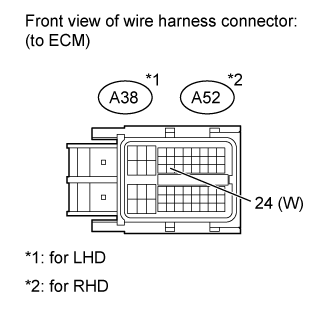Ecd System (W/ Dpf) Mil Circuit
DESCRIPTION
WIRING DIAGRAM
INSPECTION PROCEDURE
CHECK THAT MIL IS ILLUMINATED
CHECK WHETHER MIL TURNS OFF
CHECK HARNESS AND CONNECTOR (CHECK FOR SHORT IN WIRE HARNESS)
CHECK HARNESS AND CONNECTOR (COMBINATION METER - ECM)
CHECK THAT MIL IS ILLUMINATED
CHECK THAT ENGINE STARTS
INSPECT COMBINATION METER ASSEMBLY (MIL CIRCUIT)
ECD SYSTEM (w/ DPF) - MIL Circuit |
DESCRIPTION
The MIL (Malfunction Indicator Lamp) is used to indicate vehicle malfunctions detected by the ECM. When the engine switch is turned on (IG), power is supplied to the MIL circuit, and the ECM provides the circuit ground which illuminates the MIL.The MIL operation can be checked visually. When the engine switch is first turned on (IG), the MIL should be illuminated and should then turn off when the engine is started. If the MIL remains illuminated or is not illuminated, conduct the following troubleshooting procedure using the GTS.
WIRING DIAGRAM
INSPECTION PROCEDURE
- NOTICE:
- Inspect the fuses of circuits related to this system before performing the following inspection procedure.
- After replacing the ECM, the new ECM needs registration (Click here) and initialization (Click here).
| 1.CHECK THAT MIL IS ILLUMINATED |
Perform troubleshooting in accordance with the table below.
ResultCondition
| Proceed to
|
MIL remains on
| A
|
MIL does not illuminate
| B
|
| 2.CHECK WHETHER MIL TURNS OFF |
Connect the GTS to the DLC3.
Turn the engine switch on (IG) and turn the GTS on.
Check if DTCs have been stored (Click here). If DTCs are present, write them down.
Clear DTCs (Click here).
Check that the MIL turns off.
- Standard:
- MIL turns off.
| OK |
|
|
|
| REPAIR CIRCUITS INDICATED BY OUTPUT DTCS |
|
| 3.CHECK HARNESS AND CONNECTOR (CHECK FOR SHORT IN WIRE HARNESS) |
Disconnect the ECM connector.
Turn the engine switch on (IG).
Check that the MIL is not illuminated.
- OK:
- MIL is not illuminated.
Reconnect the ECM connector.
| 4.CHECK HARNESS AND CONNECTOR (COMBINATION METER - ECM) |
Disconnect the ECM connector.
Disconnect the combination meter connector.
Measure the resistance according to the value(s) in the table below.
- Standard Resistance:
for LHDTester Connection
| Condition
| Specified Condition
|
E8-12 (CHK) - A38-24 (W)
| Always
| Below 1 Ω
|
E8-12 (CHK) or A38-24 (W) - Body ground
| Always
| 10 kΩ or higher
|
for RHDTester Connection
| Condition
| Specified Condition
|
E8-12 (CHK) - A52-24 (W)
| Always
| Below 1 Ω
|
E8-12 (CHK) or A52-24 (W) - Body ground
| Always
| 10 kΩ or higher
|
Reconnect the ECM connector.
Reconnect the combination meter connector.
| | REPAIR OR REPLACE HARNESS OR CONNECTOR |
|
|
| 5.CHECK THAT MIL IS ILLUMINATED |
Check if the MIL is illuminated when the engine switch is turned on (IG).
- OK:
- MIL is illuminated.
| 6.CHECK THAT ENGINE STARTS |
Turn the engine switch on (IG).
Start the engine.
ResultResult
| Proceed to
|
Engine starts
| A
|
Engine does not start*
| B
|
- HINT:
- *: The GTS cannot communicate with the ECM.
| 7.INSPECT COMBINATION METER ASSEMBLY (MIL CIRCUIT) |
See the combination meter troubleshooting procedure (Click here).
| | REPAIR OR REPLACE HARNESS OR CONNECTOR (COMBINATION METER - ECM) |
|
|


